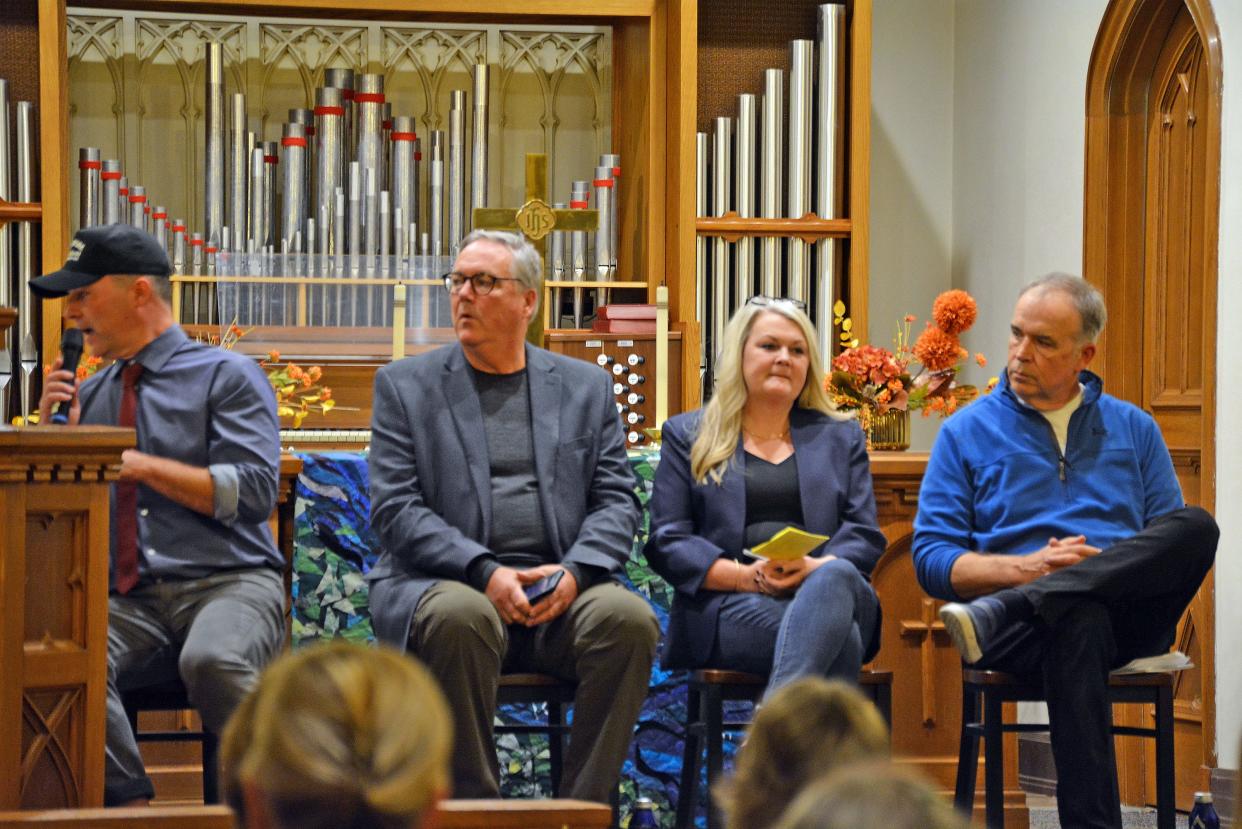Panel discussing rural water quality in Columbia cites need for stronger policy
Enforcement of antitrust legislation with regard to industrialized agriculture and farmers adopting fertilizer practices that have less impact on the water table is what is needed in Missouri to improve rural water quality.
Those were two of the key takeaways from a panel discussion Thursday hosted at Missouri United Methodist Church by the Missouri Rural Crisis Center.
Joining the panel was MRCC Communications Director Tim Gibbons, retired University of Iowa water quality research engineer Chris Jones, Blue Missouri Executive Director Jess Piper and Livingston County farmer Dough Doughty. Around two dozen people attended the event.

The panel also was a stop on a book tour for Jones, who wrote "The Swine Republic: Struggles with the Truth about Agriculture and Water Quality."
Essays Jones wrote in a blog through the University of Iowa with warnings about rural water quality eventually would lead to his voluntary retirement following complaints from an industrialized agriculture corporation that provided financial support to the university, he said.
"Environmental issues, and especially water quality are so closely connected to policy, I thought it was important for me to talk about that," Jones said. "Politicians will say, "Scientists shouldn't talk about policy.' Well, I think that is wrong and politicians certainly feel no reservations talking about science."
Gibbons returned from Washington, D.C., Wednesday where he met with representatives who possibly were hearing about certain rural issues for the first time, he said. He was pleased that the recently approved continuing resolution kicked the can on the farm bill to next year, so that organizations like MRCC have time to mobilize lobbying efforts.
Incentive programs for farmers between the late 1980s and early 2000s were limited to family farmers and not more industrialized or concentrated animal feeding operations, or CAFOs, that can contain thousands to tens of thousands of pigs. That changed with the 2002 farm bill, Gibbons said.
MRCC and its concern with CAFOs relates, in part, back to water quality. More animals means more manure and a need to store it in some fashion, such as through digestors or lagoons and its eventual spread on farmland as fertilizer. Farmland runoff and leaks from waste lagoons into waterways is the concern. So, an interactive map, using Missouri Department of Natural Resources data was created to show water quality impacts in Missouri.
The digestors are commodifying the gas that is produced to the point it is becoming the product instead of milk from dairy farms, for instance, Gibbons said, adding this could lead to increases in factory farming and inversely impacting commodity and consumer prices.
So, the solution is enforcement of antitrust legislation and a moratorium on mergers, Gibbons said.
"What we need to do in this new farm bill is we need a new vision. ... We need to stop subsidizing factory farms with our public money. We need to stop new biogas digestors, a false solution to our climate issue. We need to stop guaranteed loans and preempting state and local laws. They took away local control in Missouri to fight back against these operations," he said.
Farms are going to need to apply fertilizer, but it can be done in a smarter way and farms need to be replanned with more buffers, Doughty said.
Farmers need to think of fencing in nutrients in the same way that think of fencing in livestock, he said.
"It is a sense of urgency when livestock gets out. ... Why don't we have that same sense of urgency with our nutrients," Doughty said, adding typical thinking is if something gets washed away with a storm, the solution is to reapply.
He wants farmers to adopt some common-sense solutions for reducing the potential of nitrates and phosphates getting into water. This includes not spraying fertilizer when it is raining or the ground is frozen and including prairie buffer areas so farmland does not directly abut waterways. He also is a proponent of cover crops and minimal to no-till farming.
Piper shared what inspired her to run for office in 2022 and the continued decline she is seeing in rural areas from industrialized farming. While she does not see herself running for office again like she did through her unsuccessful campaign in 2022, she is working to support candidates so there are contested ballot races, reminding guests that rural residents are not always farmers.
Charles Dunlap covers local government, community stories and other general subjects for the Tribune. You can reach him at cdunlap@columbiatribune.com or @CD_CDT on Twitter. Subscribe to support vital local journalism.
This article originally appeared on Columbia Daily Tribune: Panel pushes for policy, farming practice changes on water quality
